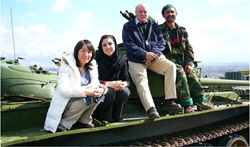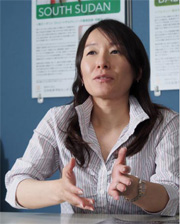Home > Highlighting JAPAN > Highlighting Japan AUGUST 2012 > Building Pride and Confidence in Post-Confrict Zones
Highlighting JAPAN
[SERIES] Yamato Nadeshiko
Building Pride and Confidence in Post-Confrict Zones
Rumiko Seya is the secretary-general of the Japan Center for Conflict Prevention (JCCP). She is one of the few specialists in the world engaged in the disarmament, demobilization and reintegration into society of former combatants (DDR) in post-conflict situations. Seya has worked in Afghanistan, the Balkans, Somalia, Kenya, Rwanda, Sierra Leone, Cote d'Ivoire and South Sudan. Osamu Sawaji of The Japan Journal interviewed Seya.

Rumiko Seya (left) with a soldier of Afghanistan's national army (right) and two UN workers at a collection site for heavy armaments in Afghanistan, 2004
Credit: COURTESY OF JCCP
What was the thinking that led you to pursue conflict resolution as your work?
Rumiko Seya: The catalyst was a photograph I saw of a Rwandan refugee mother and child that was published in a newspaper in April 1994. It captured a moment of a crying child next to a mother who was about to die of cholera in a refugee camp. Looking at the scene, I began to wonder what caused the huge difference in life experienced by that family and myself, and for the first time in my life learnt that the world is much more complicated than I had thought. They were in a position where they were dying without being able to change anything for themselves but I recognized that there was a decisive difference in that as long as I made the effort myself, I lived in a society where I could change things. So then I thought that I would like to become a person who can change conditions for those people who cannot alter conditions for themselves.
There were already lots of experts who were specialized in humanitarian aid such as medicine, food or shelter, so I wanted to try something else to help fill the gap between supply and demand on the ground. There was no school in Japan specialized in conflict resolution so I became increasingly convinced that I should do this myself.

Rumiko Seya, secretary-general of the Japan Center for Conflict Prevention (JCCP)
Credit: TADASHI AIZAWA
What kind of work were you doing in Afghanistan for two years from 2003?
As a member of the Japanese Embassy in Afghanistan, I was responsible for disarmament, demobilization and reintegration of military factions. While cooperating with the United Nations' DDR effort, I collected various data such as military satellite photographs, number of troops, political ambitions of the commanders and so on, what would then be utilized in negotiations with the commanders of military factions. In Afghanistan soldiers have enormous pride in their weapons as it is a part of their culture, especially for men. It is very important to create conditions where giving up their weapons is a benefit to them without hurting their pride.
At the area designated for disarmament outside of Kabul, soldiers told us, "Because Japan said so, we will trust you and surrender our weapons." Disarmament is an extremely political, sensitive activity. However, even in the Middle East and Africa, I was seen as being impartial so, in making progress toward disarmament, the fact that I was Japanese worked very much in my favor.
There was a period when I met President Hamid Karzai together with the Japanese ambassador to report on the state of disarmament. The president was very upbeat, told lots of jokes and is a person who is very skillful at putting the people around him at ease. Although he met many people every day, one time he turned to me and said, "Last week, you sat in that chair and looked very cold [from the air conditioning] so wouldn't it be better if you sat over here?" surprising me with his memory.
In a conflict zone, where there is heightened tension, is it helpful to have female staff?
In a conflict, women and children are the most likely to suffer harm. As a woman, I can approach such people directly. For example, at JCCP, in Somalia, among the victims who have been displaced because of drought and civil war, we are supporting many victims of sexual assault and domestic violence. These women talk about their injuries and mental anguish, things which they might not be able to tell to men, to female staff.
In Somalia, we are also running a campaign sending messages to preserve the dignity of women using SMS (short messages) on cell phones. These messages are thought up by women refugees. Because of this, these women can have self-confidence. We are focusing on capacity-building of local communities so that victims of conflict may also have a hand in improving society.
© 2009 Cabinet Office, Government of Japan






